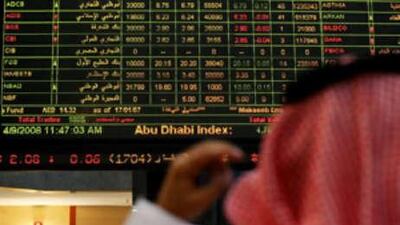ABU DHABI // A retreat by international investors from emerging markets and tightening credit across the Gulf has punished regional property and financial stocks. Banking and property shares tumbled last week, helping to drag broader indexes down and knocking Dh28.1 billion (US$7.6bn), or roughly three per cent, off the combined market capitalisation of the Dubai and Abu Dhabi stock exchanges.
Locally, shares in some of the biggest industry players suffered sharp declines. Sorouh Real Estate and Aldar Properties fell last week by six per cent, while National Bank of Abu Dhabi dropped seven per cent, First Gulf Bank fell eight per cent and Union Properties slid 14 per cent. Looming over global markets is the prospect of slowing growth across the US, Europe and Japan that economists warn will drag on growth in booming emerging markets next year, cutting demand for everything from Chinese-made electronics to oil and petrol.
Mounting losses among big banks from the widening property slump are also reducing the amount of credit available to borrowers everywhere, even in the Gulf, where borrowing costs have been rising in the past month. Exacerbating declines in regional markets, analysts say, is an about-face by foreign investors who have been pouring money into Gulf stocks and other assets amid speculation that the region is on the verge of revaluing its currencies upwards against the US dollar.
Statements by Gulf officials reaffirming the region's dollar peg have convinced investors that such a revaluation is not imminent. "The liquidity that poured into the region in 2007 has actually gone away now because investors are not expecting a de-peg," Jason Goff, the head of treasury sales at Emirates NBD, told Reuters. With few large listed oil-related companies to choose from, foreign investors tend to use banks and property companies as proxies for the region's economy.
So while they tend to rise faster than the market in times of strong foreign interest, they also suffer whiplash when foreign money exits. Analysts say the outlook for both the region's economies and property markets still look bright. While some warn of a potential glut as new properties become available in Dubai next year, most regional housing markets are being supported by a continued influx of foreign residents and a growing middle class, they say.
"Those increases in interest rates are still superseded by healthy profits from price appreciation and income yields," said Eamon Alashkar, the head of capital investment at Colliers International in Dubai. "So for as long as income yields remain higher than borrowing rates, there won't be much decline in investor appetite." In a report last week, Morgan Stanley said it expected prices in Abu Dhabi to rise 25 per cent between this year and 2010, and prices in Qatar to climb by 15 per cent in the same period.
It also warned that prices in Dubai were likely to fall by 10 per cent. The exodus of so-called "hot money" from foreign investors and the rise in borrowing costs are also part of an intentional effort by Gulf central banks to rein in rapid credit growth that is fuelling double-digit inflation. The dollar peg deprives Gulf central banks of the ability to fight inflation by raising interest rates directly - they have to keep rates equal to those set by the US Federal Reserve to keep their currencies fixed.
But central bankers have been taking other measures. Oman, Saudi Arabia and the UAE, for example, have raised the proportion of deposits they require banks to keep on hand, lowering what they can lend out. Bankers say that loan demand remains strong, however. With deposit levels failing to keep up and reserve requirements rising, banks have been venturing increasingly into the interbank market for loans, helping to push interest rates higher.
The UAE's one-month Emirates Interbank Offered Rate (Eibor) has climbed by roughly 30 per cent since early June. The equivalent interbank rates in Saudi Arabia and Kuwait have risen about 75 per cent since May. "It's also a reflection that credit spreads were too low and didn't reflect the risk," said Jeremy Parrish, the chief executive of Standard Chartered's Abu Dhabi operations. "It's an appropriate correction."
@Email:warnold@thenational.ae

